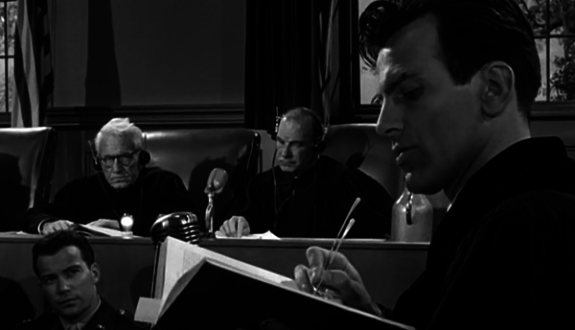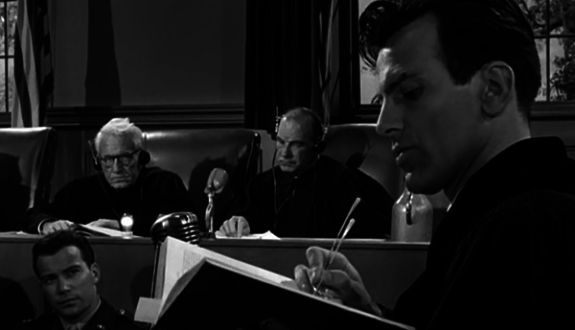The Greatest Lawyer Movies of All Time: Judgment at Nuremberg
- by
- Nov 15, 2016
- Legal Movies
- Reviewed by: Matt Riley


For this week’s edition of The Greatest Lawyer Movies of All Time, I decided to watch #12 on the ABA’s Top 25…
Judgment at Nuremberg
1961 dir. Stanley Kramer
In normal times, it’s considered an affront to rhetorical decency to compare people you disagree with to the Nazis. Hitler and his regime were so evil that it’s almost always ridiculous – and offensive – draw them into an argument by analogy.
These aren’t normal times. Trump’s brand of white nationalist neo-fascism has been well described, and his campaign – distinguished by a cult of personality, the scapegoating of minorities, the demonization of the press, threats to lock up political opponents, etc. etc. – have driven home for many Americans how fragile our institutions actually are. Maybe liberal democracy didn’t bring about the end of history after all. Maybe, sometimes, history goes backwards.
I’m not suggesting that Trump wants turn himself into a dictator, as Hitler did soon after his own electoral victory in 1933. Nor do I mean to suggest that he plans to carry out genocide or start World War III. But I cannot ignore the historical parallels between Trump’s unprecedented candidacy and the rise of the Third Reich. I think doing so is dangerous and disrespectful in its own way. The enormity of human suffering brought on by the Holocaust literally cannot be fathomed. It is the responsibility of all subsequent generations to honor that suffering by remembering it, learning from it, and remaining vigilant to make sure nothing like it can ever happen again. Never forget.
“Judgment at Nuremberg” is a movie about not forgetting. It is a fictionalized account of the “Judges Trial,” a military tribunal in which Nazi jurists were held to account for their crimes against international law and humanity. Written by Abby Hoffman, directed by Stanley Kramer, and starring Spencer Tracy as Judge Dan Hayward, it is an impeccable work of historical fiction. It is elegantly filmed, powerfully acted, and morally urgent.
The irony of the trial is that those being judged are themselves judges. The four defendants were loyal party members and served on the bench under Hitler. On their watch, and with their collaboration, the German courts became a forum for executing political opponents, advancing racist ideology, and ennobling Nazi crimes with the veneer of legality. However, the defendants deny the legitimacy of the trial: they say they are being subject to victors’ justice. They also say, of course, that they had been merely following orders.
They are represented by a passionate German lawyer named Hans Rolfe, who sees the trial as not just a judgment of four men but of the German people altogether. The same could be said of the film: it is not about the particular crimes of four judges, but about the complicity of the entire nation. How could Germans – millions of regular people, people who love music and dancing and who tuck their children in at night, who think of themselves deep down as basically good – have done such evil? Not only that: how should we judge them?
“Judgment of Nuremberg” addresses these questions with intelligence and sophistication. One of the four defendants is a famous and respected jurist named Dr. Ernst Janning (Burt Lancaster). He is a man who dedicated his life to the idea of justice and the rule of law. And yet he was willing to serve the Third Reich with a swastika on his robe and enforce Hitler’s laws.
What is in such a man’s heart? The film’s protagonist, Judge Hayward, wants to know. When he looks at Janning, does he see an evil man? Or does he see a reflection of himself?
What would he have done, he asks himself. What would we have done? What will we do now?
Search the Blog

Free LSAT Practice Account
Sign up for a free Blueprint LSAT account and get access to a free trial of the Self-Paced Course and a free practice LSAT with a detailed score report, mind-blowing analytics, and explanatory videos.
Learn More
Popular Posts
-
logic games Game Over: LSAC Says Farewell to Logic Games
-
General LSAT Advice How to Get a 180 on the LSAT
-
Entertainment Revisiting Elle's LSAT Journey from Legally Blonde








